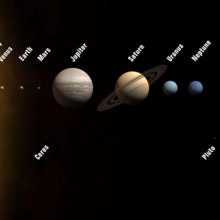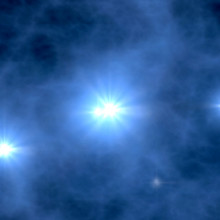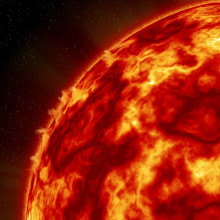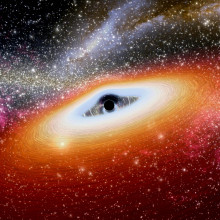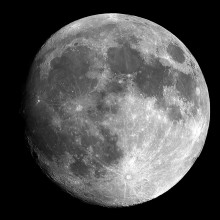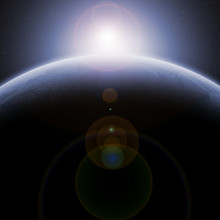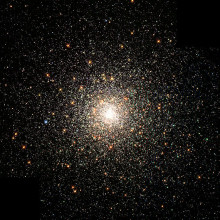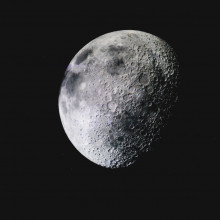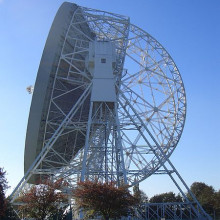Search
Is everything in space spinning in the same direction?
... come to the party to make the star, they add all of their own bit of spin and the average, when you sum it all up, some ... the planets be spinning the same way? And what about our own solar system - is everything spinning the same way in our own solar system? Matt - So many questions. Okay. So, this ...
How far is the nearest galaxy?
... years away, and we think it looks very similar to our own galaxy. It's difficult to know what our own galaxy looks like because we're in it, but calculations ... realised that these smudges were too far away to be in our own galaxy. Even Einstein fell foul of misconceptions of that ...
Was dark matter created with the Big Bang?
... be put together then there can exist things beyond our own universe and dark energy can be some kind of phenomenon that is related to stuff beyond our own universe. And so, once you have that, you could start to ... dark energy, maybe it is something that is outside our own universe that in some sense, you can say, exists ...
How high can a mountain be?
... mountains eventually tend to fall down, just through their own weight. And the important concept here is something ... a certain height, it will begin to fall down under its own weight. So, the Himalayan chain is actually beginning to ... - Thanks, Nicky. So, mountains fall down due to their own weight and the height at which they start to fall is due ...
What would happen if another galaxy collided with our own?
... that the Andromeda galaxy is going to collide with our own. In about 3 billion years, even before our sun has died, ... What would happen if another galaxy collided with our own? Would the spaces between the stars give us any chance of ... What would happen if another galaxy collided with our own? ...
Are far-away galaxies light years distant still there?
... that a star on the opposite side of the Milky Way from our own solar system has been travelling for 150 000 years before ... it arrives at the Earth. The next nearest galaxy to our own is the Andromeda galaxy and that's about 3 million light ...
How do we know that the sun rotates on its own axis?
... implications. How do we know that the sun rotates on its own axis as it's a ball of fire? It's difficult to look into ... ball of fire, so how do we know that it rotates on its own axis? How do we know that the sun rotates on its own axis? ...
Are some galaxies moving so fast as to be invisible?
... fly away from us in the exact opposite direction of our own galaxy. If these galaxies and our own accelerate there should be cases where the speed relative ...
What would happen if you lit a match in space?
... that is formed. So essentially it chokes itself in its own waste products and just goes out. What would happen if ...
Why do black holes rotate?
... form when you have a star that collapses under its own weight. There's two main processes happening inside a ...
Why doesn't the Moon get a cool name?
... of things. The answer really is that we've known about our own moon for a very, very long time. Almost to the point ...
How do scientists check the distances between planets, and how accurate are their methods?
... that we've had any idea about the outer reaches of our own solar system. How do scientists check the distances ...
What happens when a neutron star collapses?
... and it cools down a bit. It starts to collapse under its own gravity. Stars which are massive enough then start to ...
Are space races best for progress?
... amendment and refusing to cooperate with China was a huge own goal, and I think most scientists would agree. I think ...
Why is there so much radiation in space?
... maelstrom of cosmic radiation which is streaming off our own sun. If we didn't have the magnetic field of the Earth to ...
Life from Outer Space?
... are the backbone of the organic molecules that make up our own DNA. The chances of being able to find life elsewhere in ...
Why not mount a telescope on the International Space Station?
... if they're moving around. That's why they built their own satellite for the Hubble, independent of the space ...
Why are astronomical objects usually spherical?
... The simple answer is it's down to gravity. If we take our own solar system as a really good example, you have the Sun ...
Can a moon have a moon?
... be scarily easy - if a star were to pass too close to our own. Stripping the moon off the earth, we think that will ...
Why are planets round and mountains pointy?
... and larger bodies, they essentially start having their own sort of gravitational field, which kicks in a feedback ...
How strong a cable could be used to stop the moon moving away from Earth?
... that we know of, is not strong enough to support its own weight to travel up to a geosynchronous satellite. To go ...
What is the oldest known planet in our universe?
... tough one. It's very difficult to age planets outside our own solar system because we don't know what they are made of. ...
Why is space cold when it has so many stars?
... these extreme temperatures if they're so far away from our own experience of space? Ryan - So, the temperature of just ...
Could life exist on a moon?
... the question is did life ever get started there on it’s own, and that’s what we don’t know. But we know from the ...
When will telescopes see exoplanets directly?
... to really see places resembling the Earth, but not in our own solar system which is originally a kind of gob smacking ...
